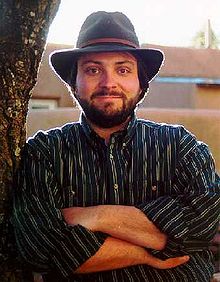Warren Sturgis McCulloch was an American neurophysiologist and cybernetician, known for his work on the foundation for certain brain theories and his contribution to the cybernetics movement. Along with Walter Pitts, McCulloch created computational models based on mathematical algorithms called threshold logic which split the inquiry into two distinct approaches, one approach focused on biological processes in the brain and the other focused on the application of neural networks to artificial intelligence.

Heinz von Foerster was an Austrian-American scientist combining physics and philosophy, and widely attributed as the originator of second-order cybernetics. He was twice a Guggenheim fellow and also was a fellow of the American Association for the Advancement of Science, 1980. He is well known for his 1960 Doomsday equation formula published in Science predicting future population growth.

William Ross Ashby was an English psychiatrist and a pioneer in cybernetics, the study of the science of communications and automatic control systems in both machines and living things. His first name was not used: he was known as Ross Ashby.
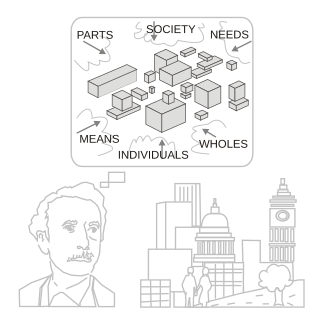
Systems Science, also referred to as systems research, or, simply, systems, is a transdisciplinary field that is concerned with understanding simple and complex systems in nature and society, for which leads to the advancements of formal, natural, social, and applied attributions throughout engineering, technology and science, itself.

In sociology, social complexity is a conceptual framework used in the analysis of society. In the sciences, contemporary definitions of complexity are found in systems theory, wherein the phenomenon being studied has many parts and many possible arrangements of the parts; simultaneously, what is complex and what is simple are relative and change in time.
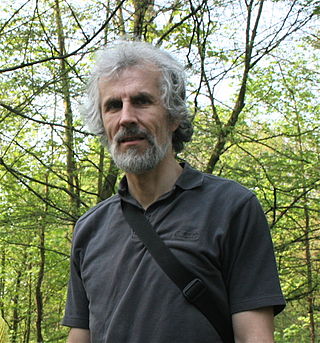
Francis Paul Heylighen is a Belgian cyberneticist investigating the emergence and evolution of intelligent organization. He presently works as a research professor at the Vrije Universiteit Brussel, where he directs the transdisciplinary "Center Leo Apostel" and the research group on "Evolution, Complexity and Cognition". He is best known for his work on the Principia Cybernetica Project, his model of the Internet as a global brain, and his contributions to the theories of memetics and self-organization. He is also known, albeit to a lesser extent, for his work on gifted people and their problems.

Valentin Fyodorovich Turchin was a Soviet and American physicist, cybernetician, and computer scientist. He developed the Refal programming language, the theory of metasystem transitions and the notion of supercompilation. He was a pioneer in artificial intelligence and a proponent of the global brain hypothesis.
A metasystem transition is the emergence, through evolution, of a higher level of organization or control.
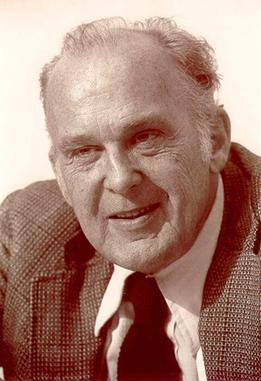
Donald Thomas Campbell was an American social scientist. He is noted for his work in methodology. He coined the term evolutionary epistemology and developed a selectionist theory of human creativity. A Review of General Psychology survey, published in 2002, ranked Campbell as the 33rd most cited psychologist of the 20th century.
Neuroinformatics is the field that combines informatics and neuroscience. Neuroinformatics is related with neuroscience data and information processing by artificial neural networks. There are three main directions where neuroinformatics has to be applied:
Principia Cybernetica is an international cooperation of scientists in the field of cybernetics and systems science, especially known for their website, Principia Cybernetica. They have dedicated their organization to what they call "a computer-supported evolutionary-systemic philosophy, in the context of the transdisciplinary academic fields of Systems Science and Cybernetics".

The global brain is a neuroscience-inspired and futurological vision of the planetary information and communications technology network that interconnects all humans and their technological artifacts. As this network stores ever more information, takes over ever more functions of coordination and communication from traditional organizations, and becomes increasingly intelligent, it increasingly plays the role of a brain for the planet Earth. In the philosophy of mind, global brain finds an analog in Averroes's theory of the unity of the intellect

Stuart Anspach Umpleby is an American cybernetician and professor in the Department of Management and Director of the Research Program in Social and Organizational Learning in the School of Business at the George Washington University.

The Environmental Molecular Sciences Laboratory is a Department of Energy, Office of Science facility at Pacific Northwest National Laboratory in Richland, Washington, United States.

Cybernetics is a field of systems theory that studies circular causal systems whose outputs are also inputs, such as feedback systems. It is concerned with the general principles of circular causal processes, including in ecological, technological, biological, cognitive and social systems and also in the context of practical activities such as designing, learning, and managing.
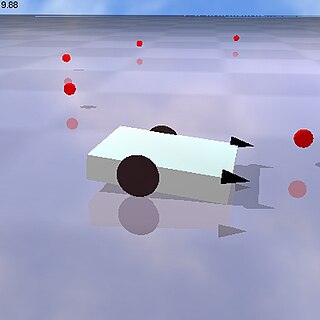
Artificial life is a field of study wherein researchers examine systems related to natural life, its processes, and its evolution, through the use of simulations with computer models, robotics, and biochemistry. The discipline was named by Christopher Langton, an American theoretical biologist, in 1986. In 1987 Langton organized the first conference on the field, in Los Alamos, New Mexico. There are three main kinds of alife, named for their approaches: soft, from software; hard, from hardware; and wet, from biochemistry. Artificial life researchers study traditional biology by trying to recreate aspects of biological phenomena.

Luis M. Rocha is the George J. Klir Professor of Systems Science at the Thomas J. Watson College of Engineering and Applied Science, Binghamton University. He has been director of the NSF-NRT Complex Networks and Systems graduate Program in Informatics at Indiana University, Bloomington, USA. He is also director of the Center for Social and Biomedical Complexity, between Binghamton University and Indiana University, Bloomington, a Fulbright Scholar, and Principal Investigator at the Instituto Gulbenkian de Ciencia, Portugal. His research is on complex systems and networks, computational and systems biology, biomedical complexity and digital health, and computational intelligence.
Cybernetica may refer to:
